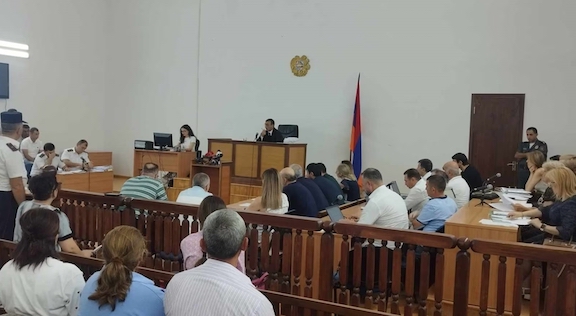A trial began on Monday for a group of opposition supporters indicted following the June 12 clashes in Yerevan between riot police and protesters demanding the resignation of Prime Minister Nikol Pashinyan.
Of the accused, fifteen face charges of “hooliganism,” while one individual is charged with participating in “mass disturbances” during the protests, which resulted in injuries to around 100 people, including several police officers.
The protests, led by Archbishop Bagrat Galstanyan, saw thousands gather on June 12 outside the Armenian parliament building, where Pashinyan was attending a question-and-answer session with lawmakers under tight security. Tensions escalated, and security forces responded by deploying dozens of stun grenades into the crowd.
The police’s use of force was widely condemned, not only by Galstanyan’s opposition-backed movement but also by leading civic groups in Armenia.
In June, the Investigative Committee announced an investigation into the “proportionality and legality” of the police actions, which left at least 83 protesters and 8 journalists injured. However, no police officers have been charged.
Galstanyan, who attended the trial’s opening, asserted that the case was politically motivated. “This is a guided political decision. It solves no legal issue. Had action also been taken against the police officers, I would have said it was a legal process,” he stated.
At the start of the trial, four of the opposition supporters were held in pre-trial custody, while eight were under house arrest. The remaining four were subjected to other restrictive measures, such as administrative control and confinement within city limits.
The defendants’ lawyers sought to have these measures modified, while prosecutors argued for their continuation to ensure due process. The court granted some of the defense’s requests, easing restrictions for several defendants, including one in pre-trial detention and others under house arrest.
The defendants largely pleaded not guilty. While some admitted to being present at the scene and acknowledged throwing bottles and other small objects at police officers, they maintained that their actions were “spontaneous” and did not cause any injuries to the officers.
If convicted, those charged with hooliganism face up to two years in prison. Participation in mass disturbances carries a potential sentence of up to three years under Armenia’s penal code.




